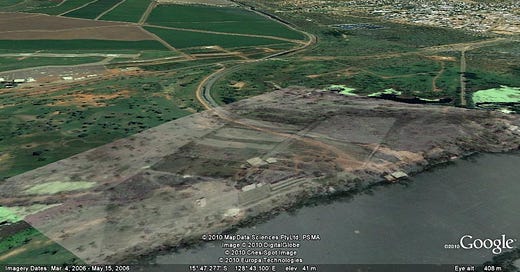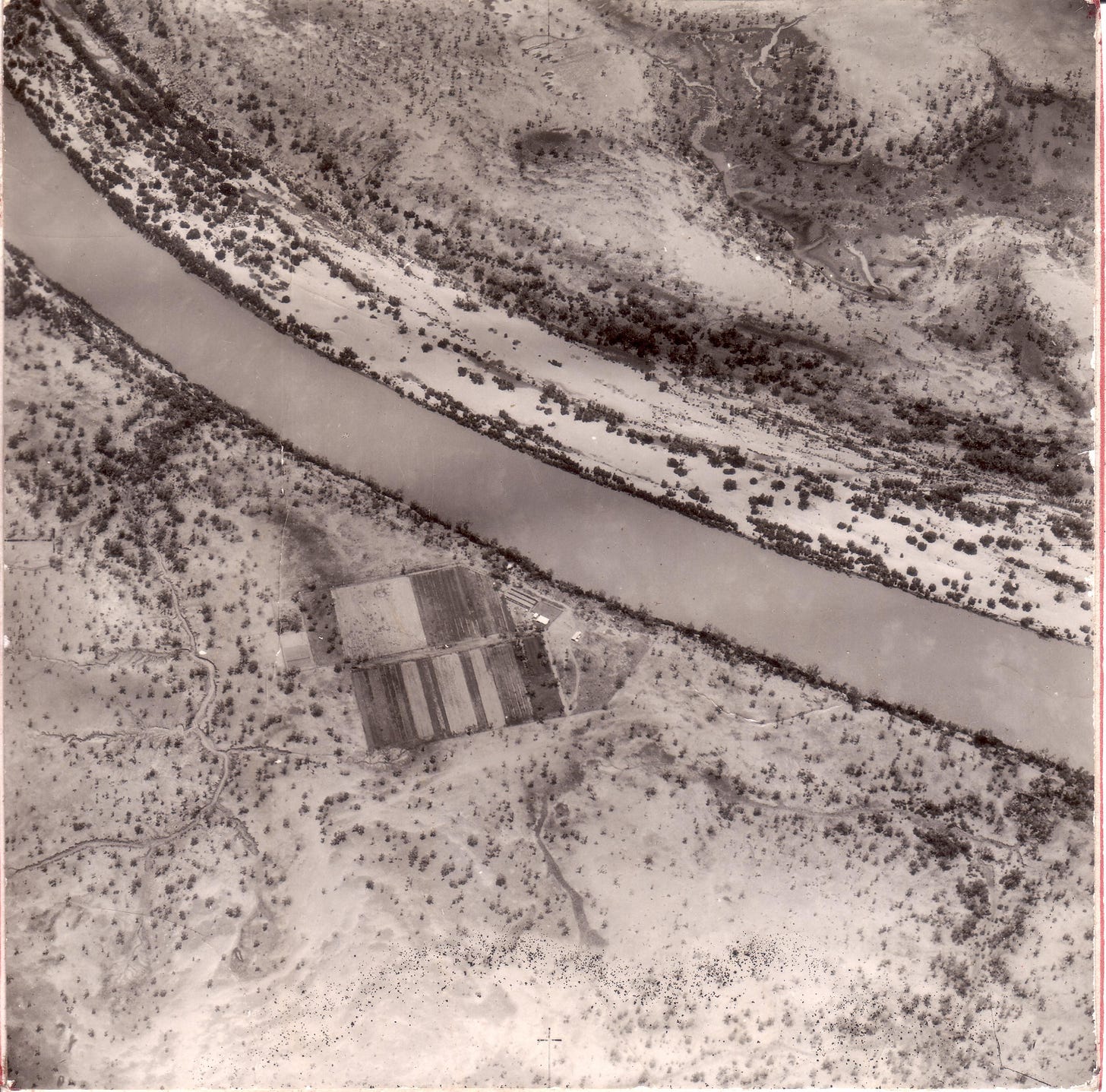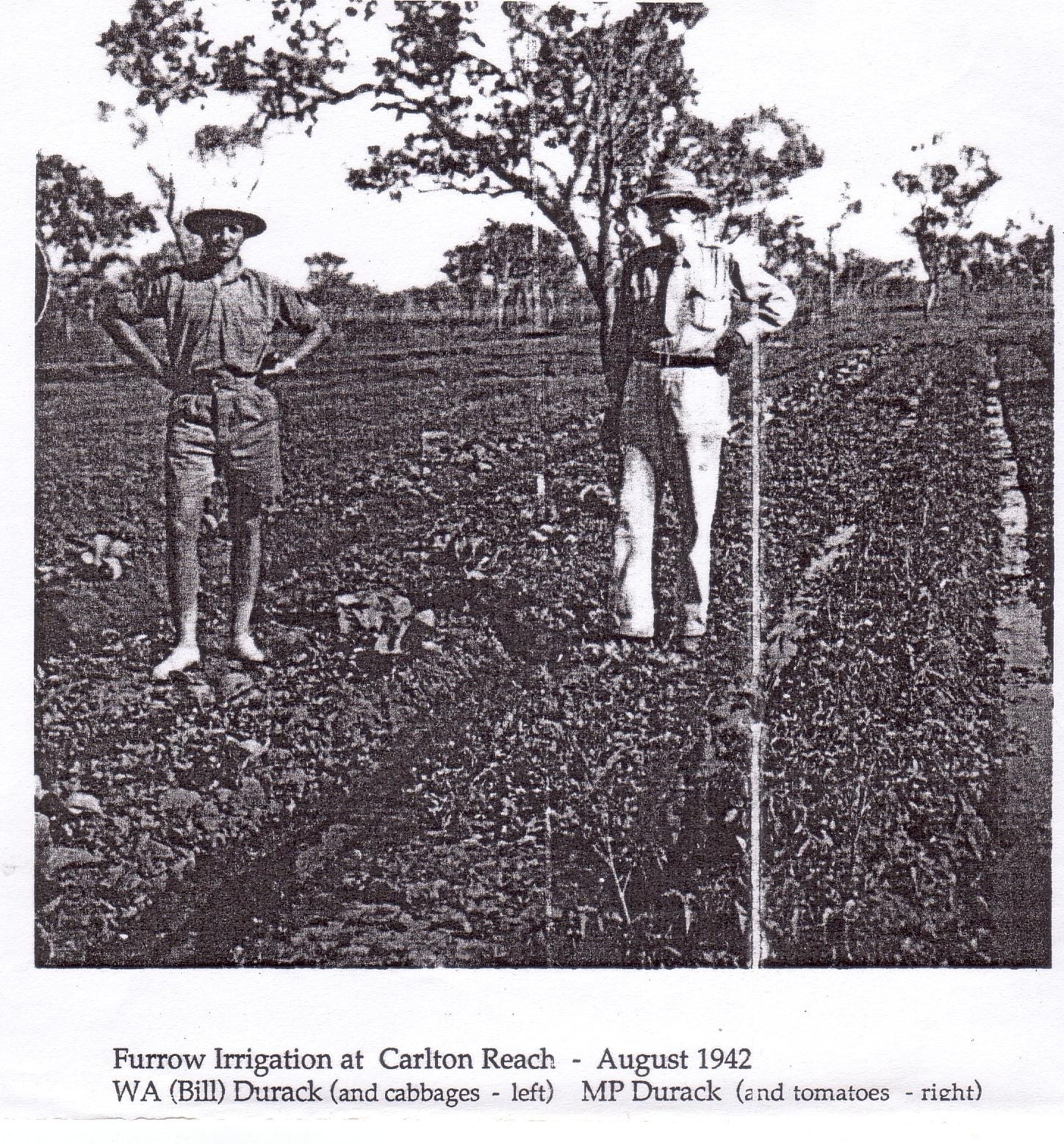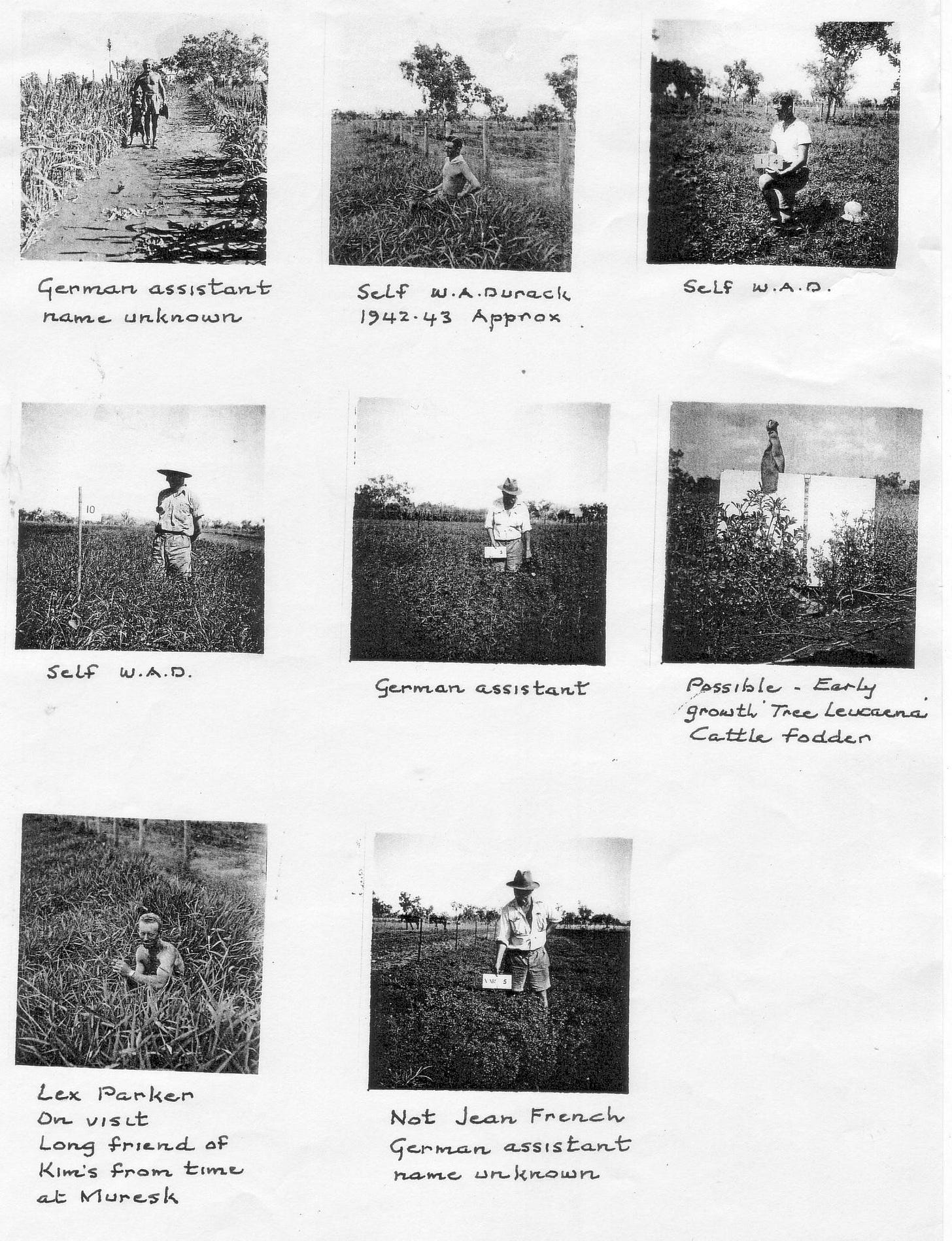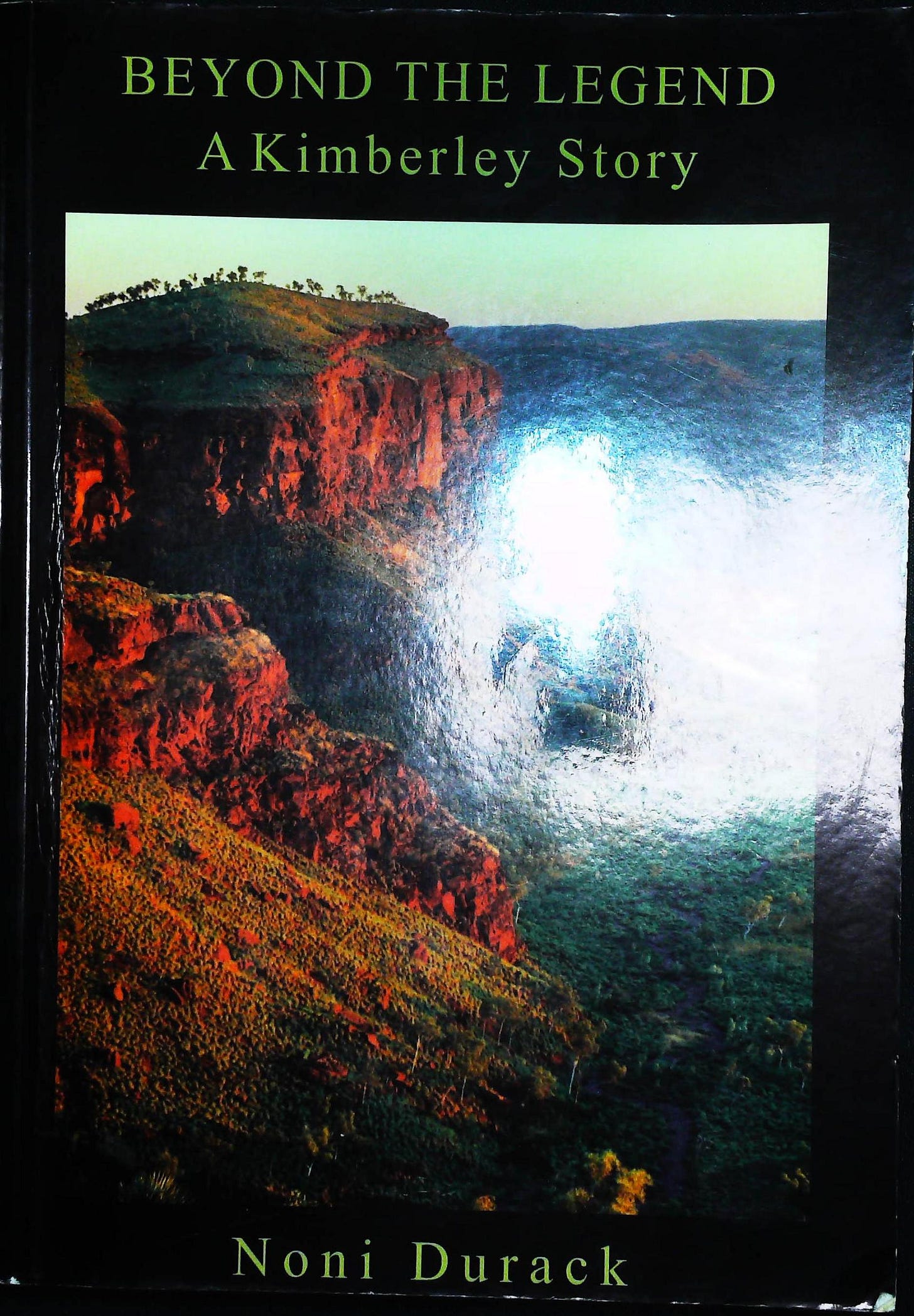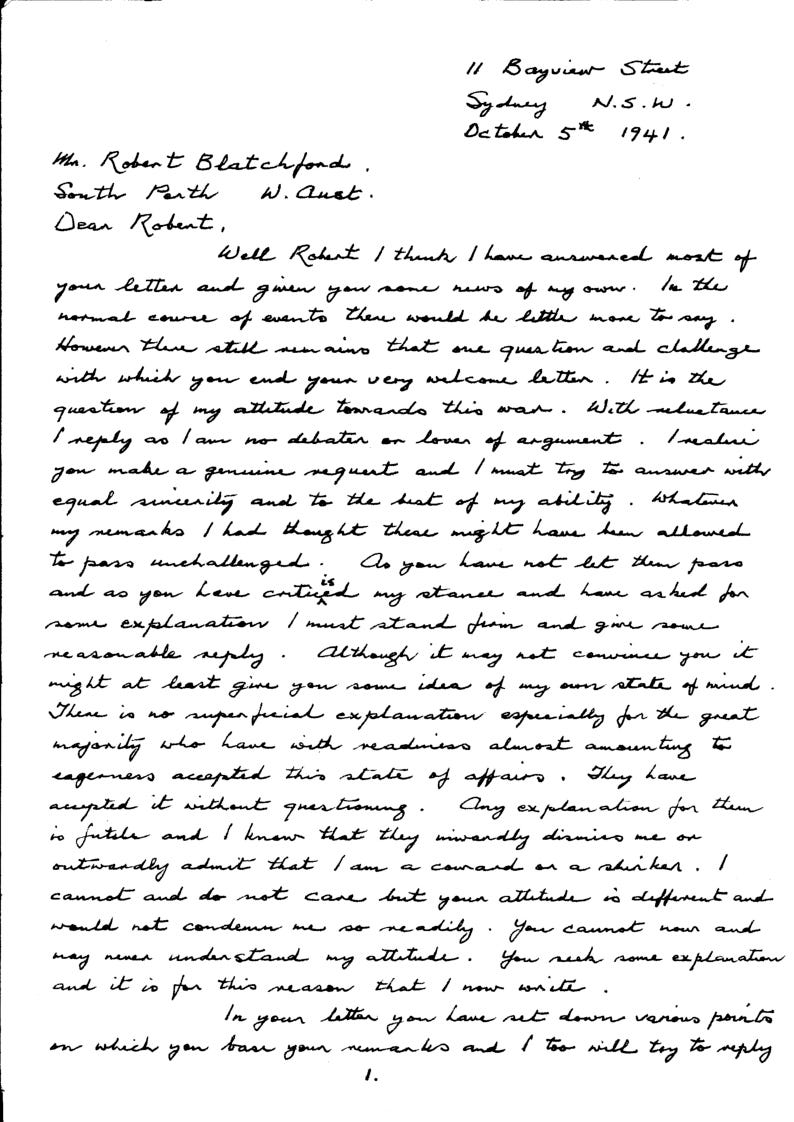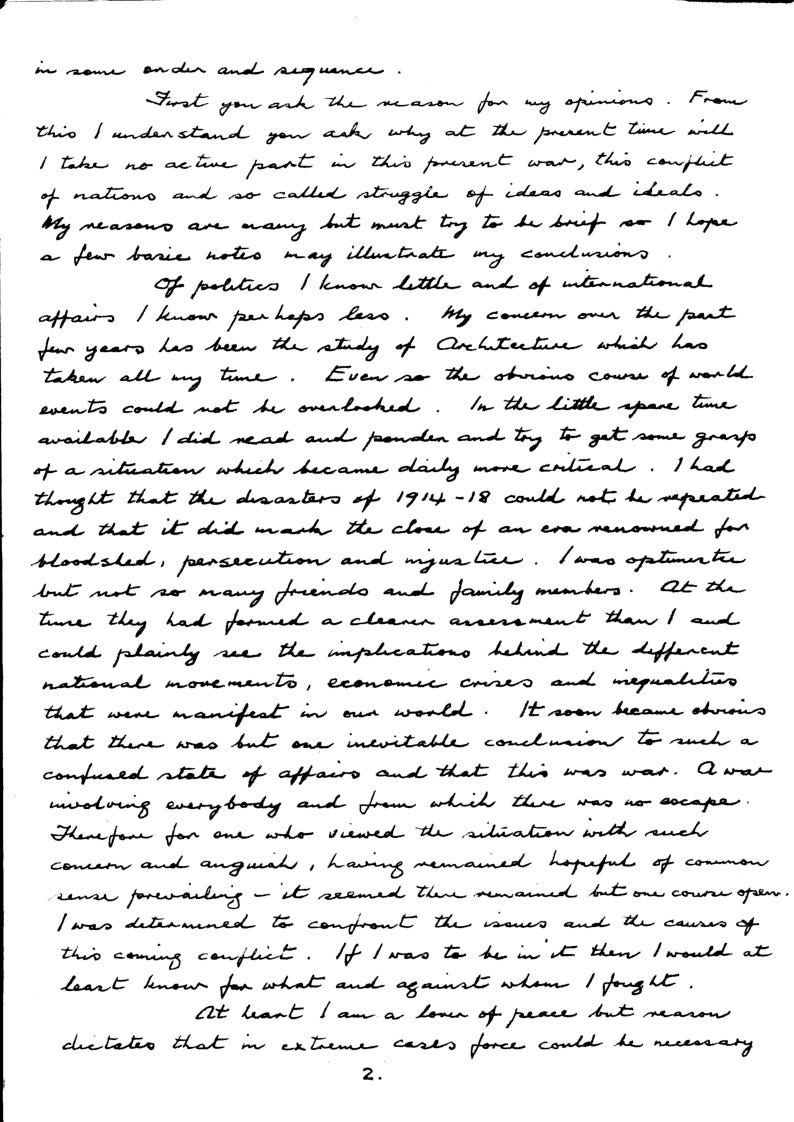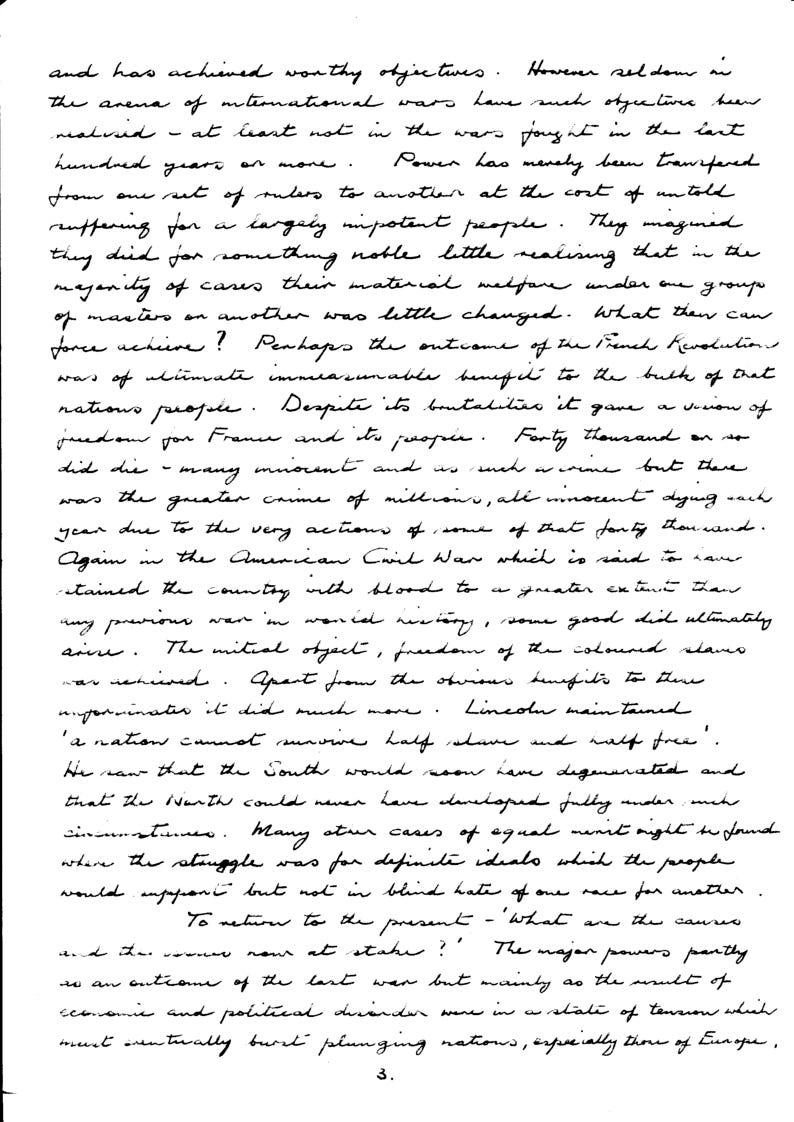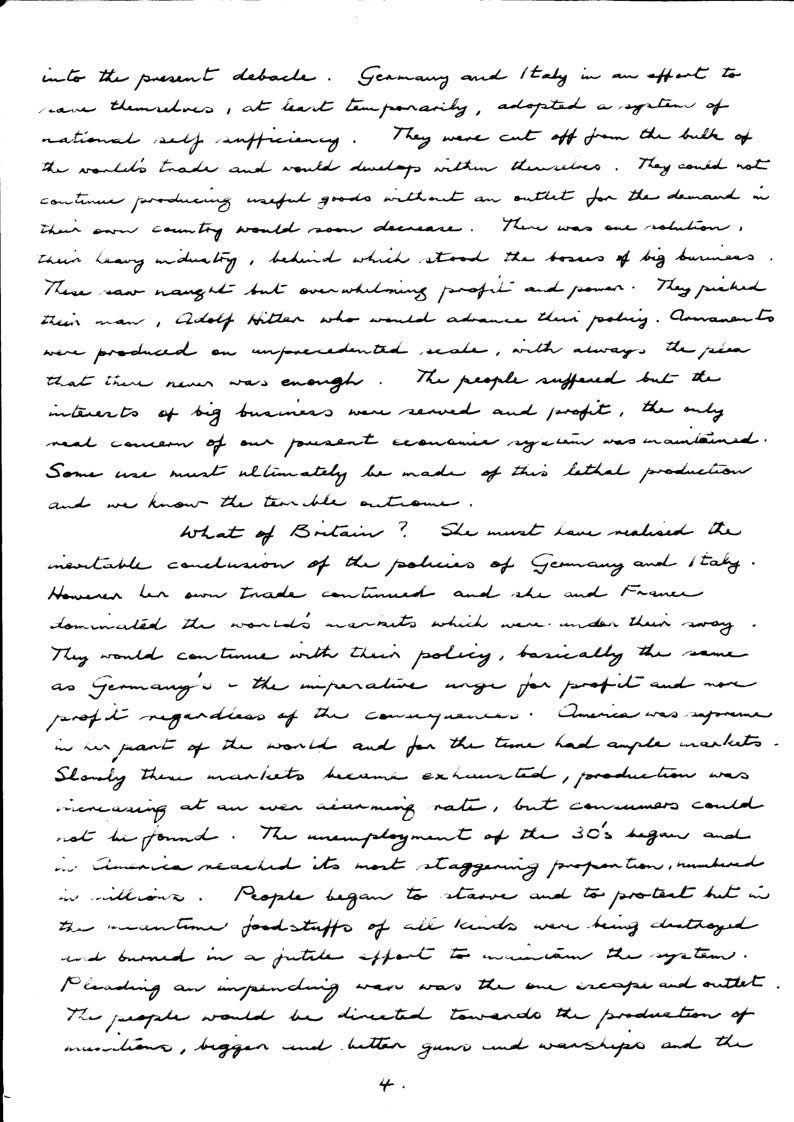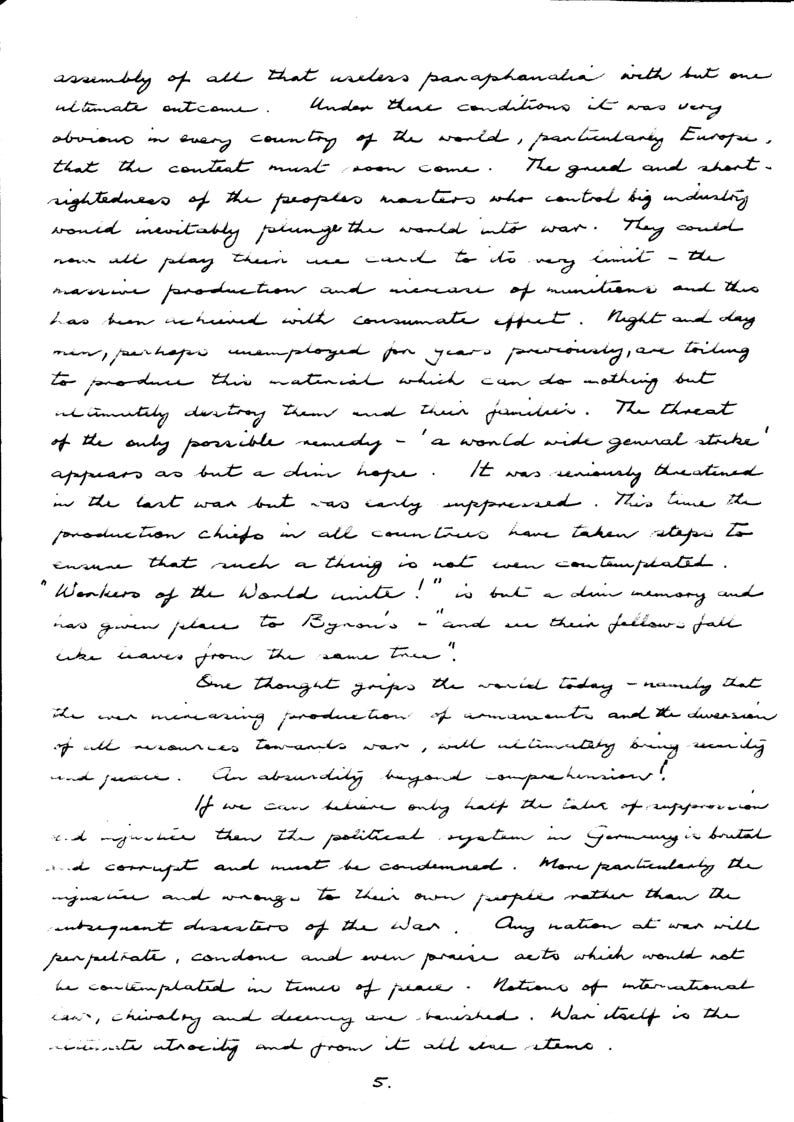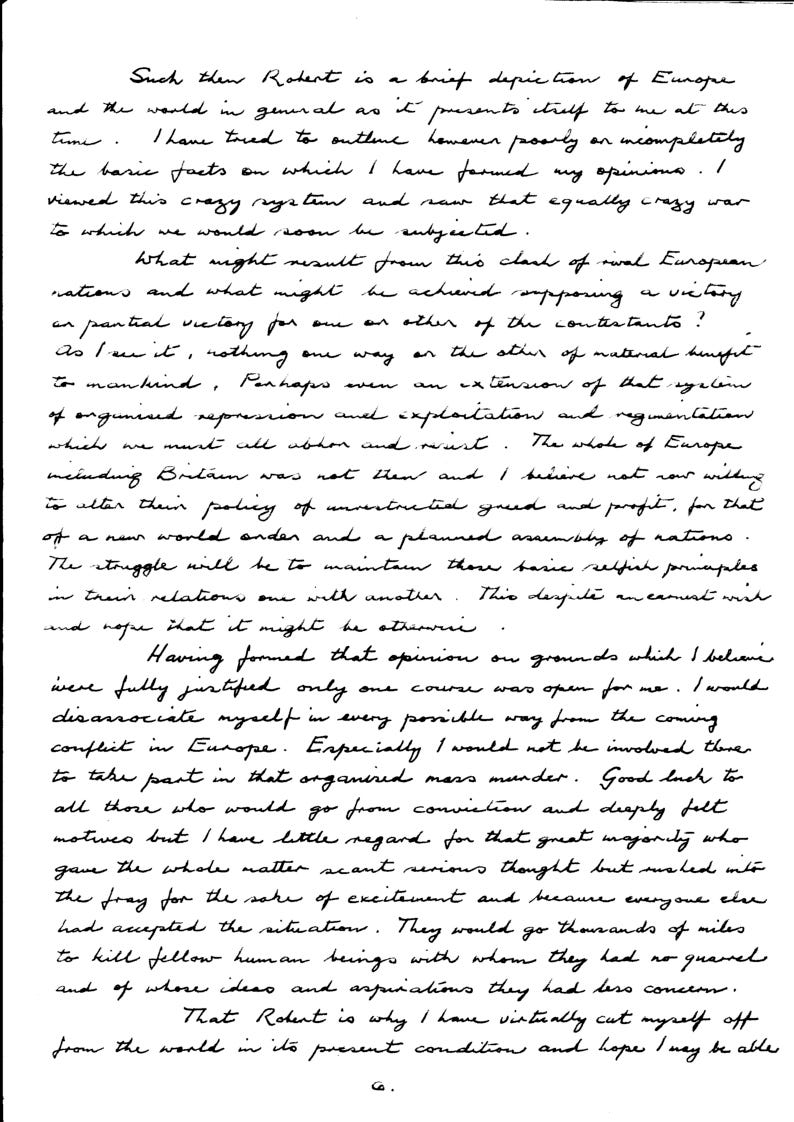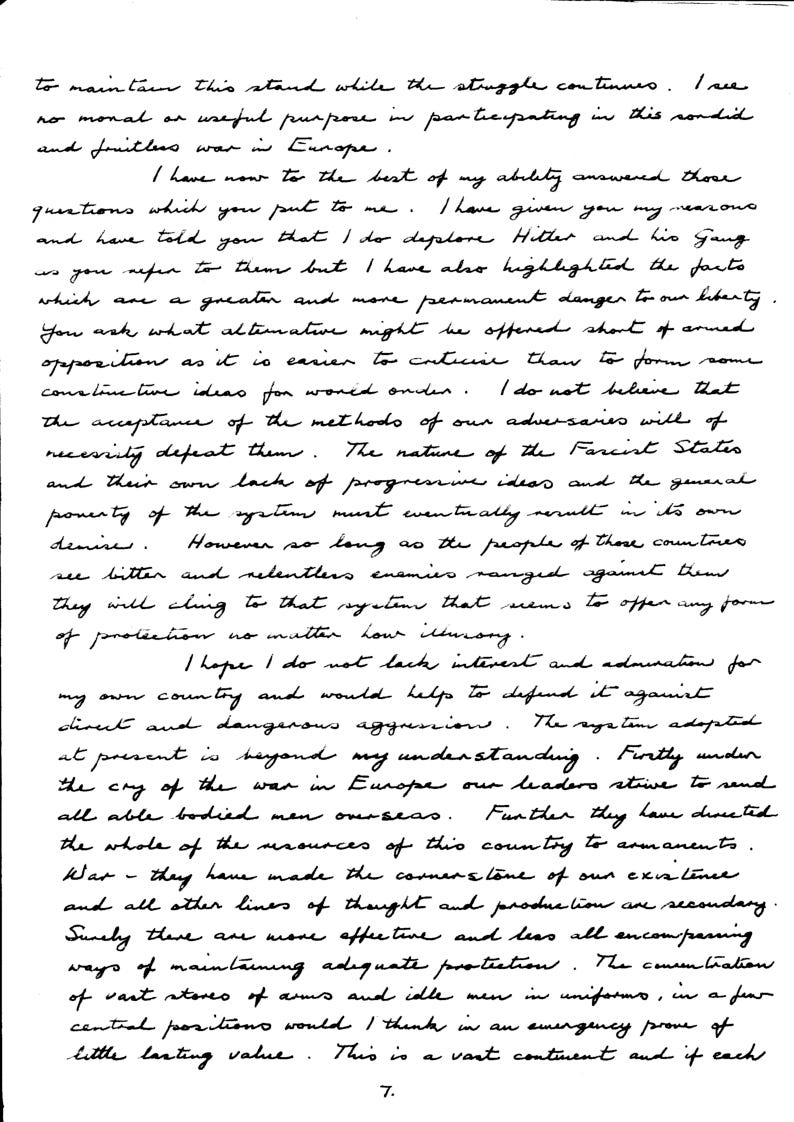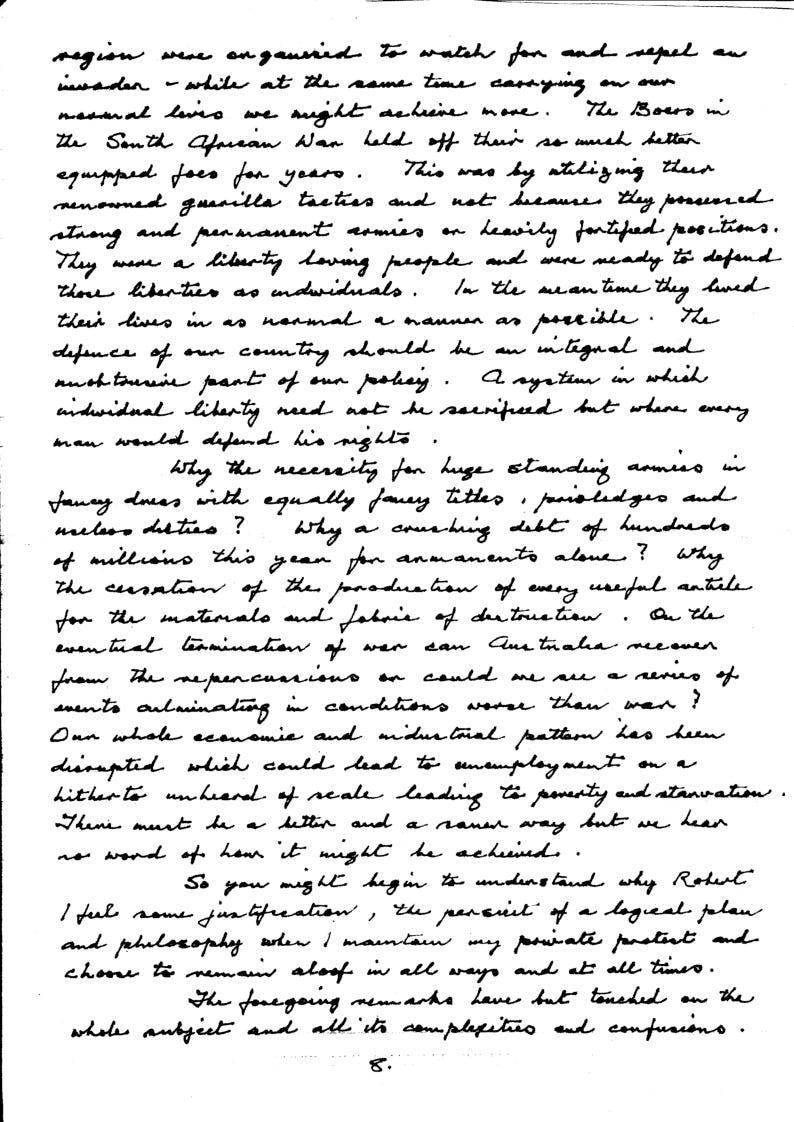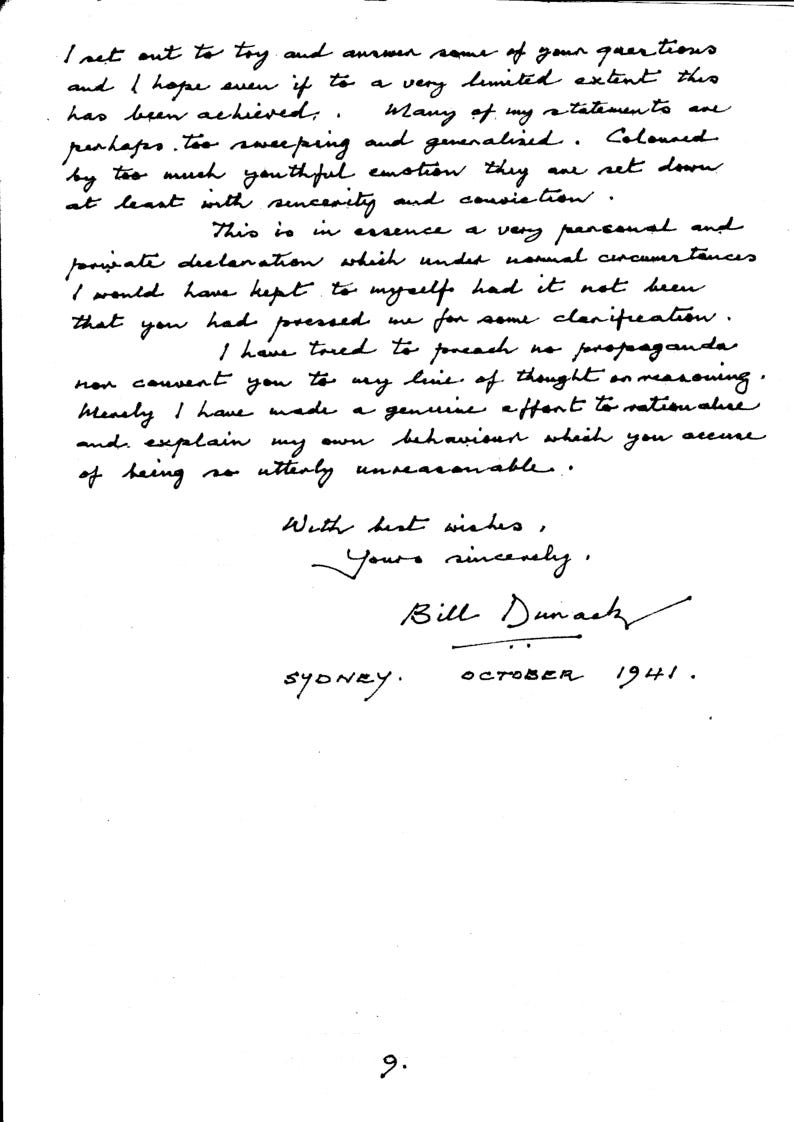A letter from the past
A letter.
Apologies for a rather “heavy” post but the world is again in a precarious place. I fear that our civilisation may have peaked and we may have lived through the best of times.
This letter was amongst dad's things in the clean-up of the old family house “Bunya” in Toowoomba.
How dad came to have a copy I am not sure. Presumably it was posted. Photo copiers were not a thing in 1941! I imagine that he transcribed a copy of it before sending it to his friend. I have no idea who Robert was and don’t recall him in family discussions over the years. It was Dad’s habit to keep copies of important letters, and this was certainly important to him as it framed his life. In any case it survives.
The issues that it deals with remain important and sadly contemporary. One hopes that in the president circumstances these decisions won't confront any of us.
I am not sure when I became aware of Dad’s decision not to go to war. It could not have been much before the 60s when I was a teenager and that would have been a fair while after the end of the war but fresh enough. Would you have told your school mates that your Dad was a pacifist or a conchie?
I don't recall there ever being much discussion of his position, but I think it was a background to my/our growing up. More so for my elder brothers who lived through the conscription and Vietnam protest era.
He did of course choose a quiet way to ensure that he did not go to war. He went to work with his brother Kim on the agricultural research station at Carlton Reach where ultimately the Ord River Dam was build and the district of Kununurra established. I understand that this “essential services or reserved occupation” work exempted him from conscription. At very least it physically separated him to a remote place. There are glimpses of his life there in my mother’s book “Beyond The Legend A Kimberley Story” (2007). (out of print but you might get a copy on the magic eBay) You have to translate the names and separate the sometimes-blended characters, but the story is there even though Dad always said it was “a fiction you know” - especially the racy bits.
I know that he would be horrified by the circumstances unfolding in Europe and Russia today. He viewed war as the ultimate waste. It so clearly is. The fog of “fake news”, blatant lies, misinformation and propaganda from all sides confuses the motivations - egos, money, power, nationalism, racism, religion and the capitalist system itself. Fortunately there is not yet any suggestion that there be “boots on the ground” in the current conflict but it may come to that. He makes it clear that he “…would help to defend it (my own country) against direct and dangerous aggression.”. That is the position the Ukrainians face in their struggle for their country and he would have supported them.
He would also have been deeply concerned by the disasters unfolding in the USA. The corporate politics, inequality and the unchecked capitalist greed fuelled by dishonest media. Not to mention the apparent breakdown of honesty, democracy and the justice systems and the resurgence of blatant racism, sexism and ignorance. The breakdown of “common sense” resulting in the needless additional deaths from the pandemic and the failure to take climate science in fact any science seriously would have particularly irked him.
Dad was a thoughtful man and grew up in I imagine a politically aware home. His father was a Member of Parliament and would have had contact with politically active people. (There is another story he told of the Russian (Isaac Steinberg, Stalin’s offsider?) who stayed with them. He came to negotiate the purchase of Kimberly (Durack) properties for the establishment of a “Jewish State” in the early 1930s. They had the good sense to pass on the idea but it was definitely a thing at the time. If I can find enough about this I may try to do a story about it. There is a book - The Un-promised Land which I have just found is accessible through this link along with many other fascinating documents of the era NSW State library)
Some body said “War is not inevitable”. I think Kevin Rudd about China. There may have been a time when this was true of Russia / Ukraine. Could capitulation have been worse than the ensuing war? Did the Ukrainians breach their agreement not to approach NATO? Did the Russians breach their agreement on the return of nuclear arms to preserve Ukrainian borders as at that time? Is it only about the money and political leverage to be made from oil and gas. Russia's Catastrophic Oil & Gas Problem . Will it propel Europe into rapid uptake of low carbon energy and break the strangle hold that the fossil fuels have over the climate and create a change in the power balances flowing through all economies? Does it come down the ego’s of the leaders after all? It is so clear that many fighters on both sides have been mislead by the propaganda machines.
Whatever the case the loss of life is appalling. We become numb to the numbers. Each represents terror, pain, heartbreak and desolation. The destruction of useful stuff - buildings, roads, bridges, crops, ports and heritage is just sad. Destruction of economies and probable famine in many parts of the world will flow from the conflict.
I have some strange uneasiness about publishing this letter. It could be that it should remain a private thing between him and his friend many years ago. I think Dad never dwelt in the past but in the present world he may hope that his thoughts could be relevant should any of us face these dilemmas.
I transcribed the letter to make it easier to read. Hope I haven’t made too many mistakes. A copy in his hand is at the end of the post.
11 Bayview Street
Sydney New South Wales
October 5th 1941
Mr Robert Blatchford
South Perth Western Australia
Dear Robert
Well Robert I think I have answered most of your letter and giving you some news of my own. In the normal course of events there would be little more to say. However there still remains that one question and challenge with which you end your very welcome letter. It is the question of my attitude towards this war. With reluctance I reply as I am no debater or lover of argument. I realise you make a genuine request and I must try to answer with equal sincerity and to the best of my ability. Whatever my remarks I had thought these might have been allowed to pass unchallenged. As you have not let them pass and as you have criticised my stance and have asked for some explanation I must stand firm and give some reasonable reply. Although it may not convince you it might at least give you some idea of my own state of mind. There is no superficial explanation especially for the great majority who have with readiness almost amounting to eagerness accepted this state of affairs. They have accepted it without questioning. Any explanation for them is futile and I know that they inwardly dismissed me or outwardly admit that I am a coward or a shirker. I cannot and do not care but your attitude is different and would not condemn me so readily. You cannot now and may never understand my attitude. You seek some explanation and it is for this reason that I now write.
In your letter you have set down various points on which you base your remarks and I too will try to reply in some order and sequence.
First you asked the reason for my opinions. From this I understand that you ask why at the present time will I take no active part in this present war, this conflict of nations and so called struggle of ideas and ideals. My reasons are many but must try to be brief so I hope a few basic notes may illuminate my conclusions.
Of politics I know little and of international affairs I know perhaps less. My concern over the past few years has been the study of architecture which has taken all my time. Even so the obvious course of world events could not be overlooked. In the little spare time available I did read and ponder and try to get some grass of a situation which became daily more critical. I had thought that the disasters of 1914 - 18 could not be repeated and that it did marl the close of a an era renowned for bloodshed, persecution and injustice. I was optimistic but not so many friends and family members. At the time they had formed a clearer assessment than I and could plainly see the implications behind the different national movements, economic crises and inequalities that were manifest in our world. It soon became obvious that there was but one inevitable conclusion to such a confused state of affairs and that this was war. A war involving everybody and from which there was no escape. Therefore for one who view the situation with such concern and anguish, waving remained hopeful of common sense prevailing - it seemed there remained but one cause open. I was determined to confront the issues and the causes of this coming conflict. If I was to be in it, then I would at least know for what and against whom I thought.
At heart I am a lover of peace but reason dictates that in extreme cases force could be necessary and has achieved were the objectives. However seldom in the arena of international wars have such objectives been realised - at least not in the wars fought in the last hundred years or more. Power has merely been transferred from one set of rulers to another at the cost of untold suffering for a largely impotent people. They imagined they died for something noble little realising that in the majority of cases their material welfare under one group of masters or another was little changed. What then can force achieve? Perhaps the outcome of the French Revolution was of ultimate immeasurable benefit to the bulk of that nations people. Despite its brutalities it gave a vision of freedom for France and its people. Forty thousand or so did die – many innocent and as such a crime but there was the greater crime of millions, all innocent dying each year due to the very actions of some of that forty thousand. Again in the American Civil War which is said to have stained the country with blood to a greater extent than any previous war in world history, some good did ultimately arise. The initial object, freedom of the coloured slaves was achieved. Apart from the obvious benefits do these unfortunates much more. Lincoln maintained “a nation cannot survive half slave and half free”. He saw that the south would soon have degenerated and that the north could never have developed fully under such circumstances. Many other cases of equal merit might be found where the struggle was for definite ideals which the people would support but not in blind hate of one race for another.
To return to the present – ‘What are the causes and issues now at stake?’ The major powers partly as an outcome of the last war but mainly as the result of economic and political disorder were in a state of tension which must eventually burst plunging nations, especially those of Europe into the present debacle. Germany and Italy in an effort to save themselves, at least temporarily, adopted a system of national self-sufficiency. They will cut off from the bulk of the world's trade and would develop within themselves. They could not continue producing useful goods without an outlet for the demand in their own country would soon decrease. There was one solution. Their heavy industry, behind which stood the bosses of big business, They saw naught but overwhelming profit and power. They picked their man, Adolf Hitler good advance their policy. Armaments were produced on an unprecedented scale, with always plea that there was never enough. The people suffered but the interests of big business were served and profit, the only real concern of our present economic system was maintained. Some use must ultimately be made of this lethal production and we know the terrible outcome.
What of Britain? She must have realised the inevitable conclusion of the policies of Germany and Italy. However her own trade continued and she and France dominated the world's markets which were under their sway. They would continue with their policy, basically the same as Germany's – the imperative urge for profit and more profit regardless of the consequences. America was supreme in her part of the world and for the time had ample markets. Slowly these markets became exhausted, production was increasing at an alarming rate, but consumers could not be found. The unemployment of the 30’s began and in America reached its most staggering proportion, numbered in millions. People began to starve and to protest but in the meantime foodstuffs of all kinds were being destroyed and buried in a futile effort to maintain the system. Pleading an impending war was the one escape and outlet. The people would be directed towards the production of munitions, bigger and better guns and warships and the assembly of all that useless paraphernalia with but one ultimate outcome. Under the circumstances it was very obvious in every country of the world, particularly Europe, that the contest must soon come. The greed and short sightedness of the peoples masters who control big industry would inevitably plunge the world in the war. They could now all play their ace card to the very limit - the massive production and increase of munitions and this has been achieved with consummate effect. Night and day men, perhaps unemployed for years previously, are toiling to produce this material which can do nothing but ultimately destroy them and their families. The threat of the only possible remedy – ‘a world wide general strike’ appears as but a dim hope. It was seriously threatened in the last war but early suppressed. This time the production chiefs in all countries have taken steps to ensure that such thing is not even contemplated. “Workers of the world unite!” is but a dim memory and has given place to Byron's “and see their fellows fall like leaves from the same tree”.
One thought grips the world today – namely that the ever increasing production of armaments division of all resources towards war, will ultimately bring security and peace. An absurdity beyond comprehension!
If we can believe only half of the talk of suppression and injustice then this political system in Germany is brutal and corrupt and must be condemned. More particularly the injustice and wrongs to their own people rather than the subsequent disasters of the war. Any nation at war will perpetuate, condone and even praise acts which would not be contemplated in times of peace. Notions of international law, chivalry and decency are banished. War itself is the ultimate atrocity and from it all else stems.
Such then Robert is a brief vision of Europe and the world in general as it presents itself to me at this time. I have tried to outline however poorly and incompletely the basic facts on which I have formed my opinions. I viewed this crazy system and saw that equally crazy war which we would soon become subjected.
What might result from this clash of rival European nations and what might be achieved supposing a victory or partial victory for one or other of the contestants? As I see it nothing one way or the other of natural benefit to mankind. Perhaps even an extension of that system of organised suppression and exploitation and regimentation which we must all abhor and resist. The whole of Europe including Britain was not then and I believe not now willing to alter their policy unrestricted greed and profit, for that of a new world order and a planned assembly of nations. The struggle will be to maintain those basic selfish principles in their relations with another, This despite an earnest wish and hope that it might be otherwise.
Having formed that opinion on grounds which I believe were fully justified only one course was open for me. I would disassociate myself in every possible way from the coming conflict in Europe. Especially I would not be involved there to take part in that organised mass murder. Good luck to all those who would go from conviction and deeply felt motives but I have little regard for the great majority who gave the whole matter scant serious thought but rushed into the fray for the sake of excitement and because everybody else had accepted the situation. They would go thousands of miles to kill fellow human beings with whom they had no quarrel and of whose ideas and aspirations they had less concern.
That Robert is why I have virtually cut myself off from the world in its present condition and hope I may be able to maintain this stand while the struggle continues. I see no moral or useful purpose in participating in this sordid and fruitless war in Europe.
I have now to the best of my ability answered those questions which you put to me. I have given you my reasons and have told you that I do deplore Hitler and his Gang as you refer to them but I have also highlighted the facts which a greater and more permanent danger to our liberty. You asked what alternative might be offered short of armed opposition as it is easier to criticise than to form some constructive ideas for world order. I do not believe that the acceptance of the methods of our adversaries will of necessity defeat them. The nature of the Fascist States and their own lack of progressive ideas and the general poverty of the system must eventually result in its own demise. Whoever so long as the people of those countries see bitter and relentless enemies ranged against them they will cling to that system that seems to offer any form of protection no matter how illusory.
I hope I do not lack interest admiration for my own country and would help to defend it against direct and dangerous aggression. The system adopted at present is beyond my understanding. Firstly under the cry of the war in Europe our leaders strive to send all able-bodied men overseas. Further they have directed the whole of the resources of this country to armaments. War - they have made the cornerstone of our existence and all other lines of thought and production are secondary. Surely there are more effective and less all-encompassing ways of maintaining adequate protection. The accumulation of vast stores of arms and idle men and uniforms in a few central positions would I think in an emergency prove of little lasting value. This is a vast continent and if each region were organised to watch for and repel and invader- while at the same time carrying on our normal lives we might achieve more. The Boers in the South African War held off their so much better equipped foes for years. This was by utilising their renowned guerrilla tactics and not because they possessed strong and permanent armies or heavily fortified positions. They were a liberty loving people and were ready to defend those liberties as individuals. In the meantime they live their lives in as normal a manner as possible. The defence of our country should be an integral and unobtrusive part of our policy. A system in which individual liberty need not be sacrificed but where every man could defend his rights.
Why the necessity for huge standing armies in fancy dress with equally fancy titles, privileges and useless duties? Why are crushing debt of hundreds of millions this year for armaments alone? Why the cessation of the production of every useful article for the materials and fabric of destruction. On the eventual termination of war can Australia recover from the repercussions or could we see a series of events culminating in conditions worse than war? Our whole economic and industrial pattern has been disrupted which could lead to unemployment on a hitherto unheard of scale leading to poverty and starvation. There must be a better and saner way but we hear no word of how it might be achieved.
So you might begin to understand why Robert I feel some justification, the pursuit of a logical plan and philosophy when I maintain my private protest and choose to remain aloof in all ways and at all times.
The foregoing remarks have but touched on the whole subject and all its complexity and confusions. I set out to try and answer some of your questions and I hope even if to a very limited extent this has been achieved. Many of my statements are perhaps to sweeping and generalised. Coloured by too much youthful emotion they are set down at least with sincerity and conviction.
This is in essence a very personal and private declaration which under normal circumstances I would have kept to myself had it not been that you had pressed me for some clarification.
I have tried to preach no propaganda nor convert you to my line of thought or reasoning. Merely I have made a genuine effort to rationalise and explain my own behaviour which you accuse of being so utterly unreasonable.
With best wishes
Yours sincerely
Bill Durack
Sydney October 1941
The letter I have is not the original but a photocopy. He must have made in the era of copiers.

